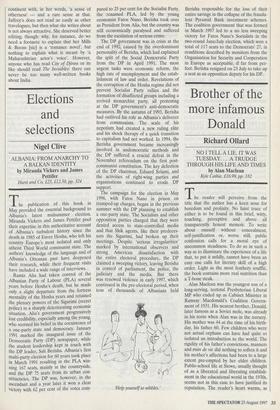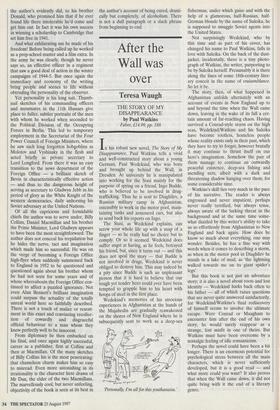Brother of the more infamous Donald
Richard 011ard
NO I TELL A LIE, IT WAS TUESDAY. . . A TRUDGE THROUGH HIS LIFE AND TIMES by Alan Maclean Kyle Cathie, £16.99, pp. 182 The reader will perceive from the title that the author has a keen nose for boredom and prolixity. No faint trace of either is to be found in this brief, witty, touching, perceptive and above all transparently honest memoir. To write about oneself without concealment, self-justification or, worse still, public confession calls for a moral eye of uncommon steadiness. To do so in such a way as to illuminate the experience of a life that, to put it mildly, cannot have been an easy one calls for literary skill of a high order. Light as the most feathery souffle, the book contains more real nutrition than a T-bone steak.
Alan Maclean was the youngest son of a long-serving, teetotal Presbyterian Liberal ME. who ended up as Cabinet Minister in Ramsay Macdonald's Coalition Govern- ment of 1931. His nearest brother, Donald, later famous as a Soviet mole, was already in his teens when Alan was in the nursery. His mother was 44 at the time of his birth- day, his father 60. Few children who were not actual orphans can have had quite so isolated an introduction to the world. The rigidity of his father's convictions, manners and train de vie did nothing to soften it and his mother's affections had been to a large extent pre-empted by her elder children. Public-school life at Stowe, usually thought of as a liberated and liberating establish- ment in the educational world in the 1930s, seems not in this case to have justified its reputation. The reader's heart warms, as the author's evidently did, to his brother Donald, who promised him that if he ever found life there intolerable he'd come and get him out. In fact it was his own success in winning a scholarship to Cambridge that set him free in 1941.
And what exhilarating use he made of his freedom! Before being called up he worked as a prep-school master and a film extra. In the army he was clearly, though he never says so, an effective officer in a regiment that saw a good deal of action in the winter campaigns of 1944-5. But once again the immediacy and economy of the writing bring people and scenes to life without obtruding the personality of the observer.
Yet personality is his long suit. Thumb- nail sketches of his commanding officers and messmates in the 11th Hussars give place to fuller, subtler portraits of the men with whom he worked when seconded to the Political Division of the Occupying Forces in Berlin. This led to temporary employment in the Secretariat of the Four Power Council of Foreign Ministers, where he saw such long forgotten hobgoblins as Molotov and Vyshinsky in the flesh and acted briefly as private secretary to Lord Longford. From there it was an easy transition to the news department of the Foreign Office — a brilliant sketch of Bevin in characteristically effective action — and thus to the dangerous height of serving as secretary to Gladwyn Jebb in his period of glory as the White Knight of the western democracies, daily unhorsing his Soviet adversary at the United Nations.
Of all the capricious and formidable chiefs the author was to serve under, Billy Collins, Daniel Macmillan and his brother the Prime Minister, Lord Gladwyn appears to have been the most straightforward. The author does not conceal his trepidation but he hides the nerve, tact and imagination which made him so successful. He was on the verge of becoming a Foreign Office high-flyer when suddenly summoned back to England in 1952 to be questioned and questioned again about his brother whom he had not seen for some years and of whose whereabouts the Foreign Office con- tinued to affect a puzzled ignorance. Not even Alan Bennett's brilliant imagination could surpass the actuality of the totally unreal world here so faithfully described. There is not a touch of malice or resent- ment in this exact and convincing recollec- tion of cowardly and disgraceful official behaviour to a man whom they knew perfectly well to be innocent.
From diplomacy he then embarked on his final, and once again highly successful, career as a publisher, first at Collins and then at Macmillan. Of the many sketches of Billy Collins his is the most penetrating: that chameleon charm makes him so easy to misread. Even more astonishing in its irrationality is the character here drawn of Mr Dan, the elder of the two Macmillans. The marvellously cool, but never unfeeling, objectivity of the book is seen at its best in the author's account of being cured, drasti- cally but completely, of alcoholism. There is not a dull paragraph or a slack phrase from beginning to end.



























































 Previous page
Previous page